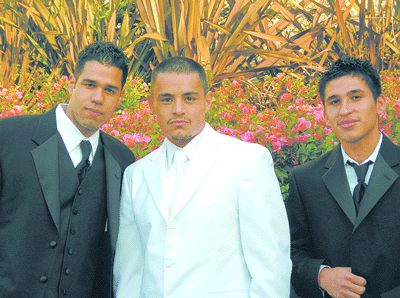Engaging and sympathetic “Quinceañera”
The outstanding film “Quinceañera” portrays the bond forged between Magdalena (Emily Rios), a pregnant 14-year-old, and her gay cousin Carlos (Jesse Garcia) in Echo Park, Los Angeles. This may be an odd choice of subject matter for filmmakers and partners Richard Glatzer and Wash Westmoreland whose last film “The Fluffer,” was an insider look at porno-filmmaking, but there are, in fact, thematic similarities between this new film and that. In both dramas, the main characters were trying to assert—or come to terms with—their identities. It is only through their unexpected and unsuccessful interactions with others that they ultimately realize who they truly are.
What the filmmakers do best—and they do it extremely well here—is capture the humanity of the main characters as they cope with pressures from the outside world. In “The Fluffer,” the two contrasting heroes were grappling with how they should behave within the context of the sex industry; here, the scenario is not dissimilar as the protagonists are faced with issues of sexual shame.
“Quinceañera” opens at one of the parties the film is named for, a “celebration of a young girl’s life—the day she turns 15, and becomes a woman.” The pomp and circumstance of the processional segues into raucous teens living it up in a Hummer limo, and the traditional customs of the event are juxtaposed against the subsequent party.
It is at this event that the film’s two main characters are introduced. Magdalena, whose cousin is being honored, is seen dancing reluctantly with Herman (JR Cruz) a boy she loves but is frustrated with, while her cousin Carlos, the black sheep of the family, unadvisedly turns up to wish his sister a happy birthday. Carlos is quickly thrown out of the party and advised by his great uncle Tomas (Chalo González) to “go home.” The film later reveals that Carlos moved in with Tomas when he was thrown out of his house by his parents for being gay.
Magdalena ends up moving in to Tomas’ house, too—after she is fitted for her cousin’s Quinceañera dress, and it is discovered that she is pregnant. Despite her adamant cries of never having been to bed with Herman, her father, a preacher, banishes her from the family home.
Although Magdalena and Carlos do not get along at first—he muddies the couch she uses as a bed by putting his dirty boots on it—the parallels in their lives soon emerge. Both ostracized for sexual activity that is taboo in their culture, they are also each misunderstood by their families—save for Tomas’s compassion.
“Quinceañera” alternates its focus between Magdalena’s struggles with her pregnancy and Carlos’ furtive sexual relationship with Gary (David W. Ross), one half of the white gay couple in the main house on Tomas’ property. Yet as both cousins are disappointed by the people they come to love, they eventually develop a true sense of self.
And it is this personal growth that makes the film so profoundly moving. The resilience of Magdalena and Carlos to be themselves in spite of other people’s preconceptions about their lives or actions, steels them for the world they live in. A terrific exchange occurs when Gary tells Carlos, “You live in a whole different world, don’t you?” and Carlos responds, “No, you do.”
Such is the nature of the film’s portrait of race, class, and sexuality. Glatzer and Westmoreland should be commended for presenting a facet of Mexican-American life that is generally not seen on screen. What’s more, the filmmakers portray the gentrification of an urban neighborhood astutely. When Magdalena goes off in search of an apartment, she finds a place owned by a lesbian who is sympathetic to her situation, but still won’t lower the rent.
The sense of injustice the characters each fight against should resonate with queer audiences. But what is really poignant is how the truth of Magdalena and Carlos’ situations are revealed.
If “Quinceañera” has a shortcoming, it is that what gets both Carlos and Magdalena into trouble with their families happens before the film opens, and the subtlety of this may be lost at first on some viewers. The filmmakers are correct in not depicting the scenes of teenage sexuality, but the characters and their relationships are introduced a bit too quickly for audiences to make all of the connections right away.
But this is a minor flaw in an otherwise excellent film. “Quinceañera” is graced with three wonderful actors. Emily Rios is superb as Magdalena, and she carries her character’s conscience in her every facial expression. Likewise, Jesse Garcia gives what should be a star-making performance here. He is totally engaging and sympathetic, and a speech he gives at the film’s end is especially moving. In support, Chalo González is wonderful in the role of Tomas, and his gentle nature shines though.
“Quinceañera” is a tremendous accomplishment for the queer filmmakers, and it is one queer audiences should celebrate as well.
gaycitynews.com



































